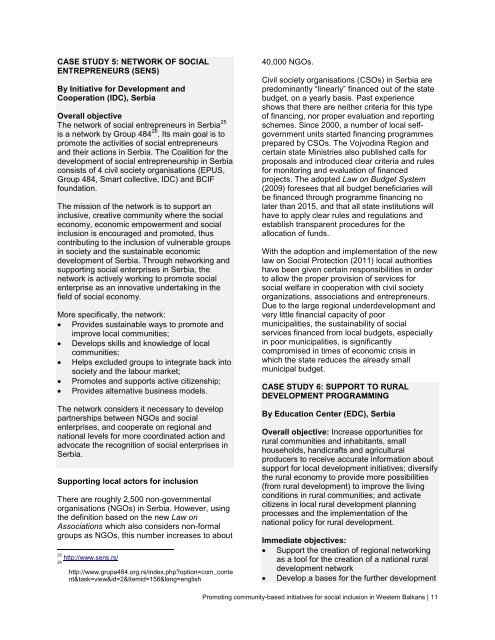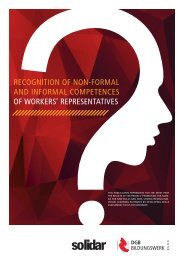Promoting community-based initiatives for social inclusion ... - Solidar
Promoting community-based initiatives for social inclusion ... - Solidar
Promoting community-based initiatives for social inclusion ... - Solidar
You also want an ePaper? Increase the reach of your titles
YUMPU automatically turns print PDFs into web optimized ePapers that Google loves.
CASE STUDY 5: NETWORK OF SOCIAL<br />
ENTREPRENEURS (SENS)<br />
By Initiative <strong>for</strong> Development and<br />
Cooperation (IDC), Serbia<br />
Overall objective<br />
The network of <strong>social</strong> entrepreneurs in Serbia 25<br />
is a network by Group 484 26 . Its main goal is to<br />
promote the activities of <strong>social</strong> entrepreneurs<br />
and their actions in Serbia. The Coalition <strong>for</strong> the<br />
development of <strong>social</strong> entrepreneurship in Serbia<br />
consists of 4 civil society organisations (EPUS,<br />
Group 484, Smart collective, IDC) and BCIF<br />
foundation.<br />
The mission of the network is to support an<br />
inclusive, creative <strong>community</strong> where the <strong>social</strong><br />
economy, economic empowerment and <strong>social</strong><br />
<strong>inclusion</strong> is encouraged and promoted, thus<br />
contributing to the <strong>inclusion</strong> of vulnerable groups<br />
in society and the sustainable economic<br />
development of Serbia. Through networking and<br />
supporting <strong>social</strong> enterprises in Serbia, the<br />
network is actively working to promote <strong>social</strong><br />
enterprise as an innovative undertaking in the<br />
field of <strong>social</strong> economy.<br />
More specifically, the network:<br />
Provides sustainable ways to promote and<br />
improve local communities;<br />
Develops skills and knowledge of local<br />
communities;<br />
Helps excluded groups to integrate back into<br />
society and the labour market;<br />
Promotes and supports active citizenship;<br />
Provides alternative business models.<br />
The network considers it necessary to develop<br />
partnerships between NGOs and <strong>social</strong><br />
enterprises, and cooperate on regional and<br />
national levels <strong>for</strong> more coordinated action and<br />
advocate the recognition of <strong>social</strong> enterprises in<br />
Serbia.<br />
Supporting local actors <strong>for</strong> <strong>inclusion</strong><br />
There are roughly 2,500 non-governmental<br />
organisations (NGOs) in Serbia. However, using<br />
the definition <strong>based</strong> on the new Law on<br />
Associations which also considers non-<strong>for</strong>mal<br />
groups as NGOs, this number increases to about<br />
25 http://www.sens.rs/<br />
26<br />
http://www.grupa484.org.rs/index.php?option=com_conte<br />
nt&task=view&id=2&Itemid=156&lang=english<br />
40,000 NGOs.<br />
Civil society organisations (CSOs) in Serbia are<br />
predominantly “linearly” financed out of the state<br />
budget, on a yearly basis. Past experience<br />
shows that there are neither criteria <strong>for</strong> this type<br />
of financing, nor proper evaluation and reporting<br />
schemes. Since 2000, a number of local selfgovernment<br />
units started financing programmes<br />
prepared by CSOs. The Vojvodina Region and<br />
certain state Ministries also published calls <strong>for</strong><br />
proposals and introduced clear criteria and rules<br />
<strong>for</strong> monitoring and evaluation of financed<br />
projects. The adopted Law on Budget System<br />
(2009) <strong>for</strong>esees that all budget beneficiaries will<br />
be financed through programme financing no<br />
later than 2015, and that all state institutions will<br />
have to apply clear rules and regulations and<br />
establish transparent procedures <strong>for</strong> the<br />
allocation of funds.<br />
With the adoption and implementation of the new<br />
law on Social Protection (2011) local authorities<br />
have been given certain responsibilities in order<br />
to allow the proper provision of services <strong>for</strong><br />
<strong>social</strong> welfare in cooperation with civil society<br />
organizations, associations and entrepreneurs.<br />
Due to the large regional underdevelopment and<br />
very little financial capacity of poor<br />
municipalities, the sustainability of <strong>social</strong><br />
services financed from local budgets, especially<br />
in poor municipalities, is significantly<br />
compromised in times of economic crisis in<br />
which the state reduces the already small<br />
municipal budget.<br />
CASE STUDY 6: SUPPORT TO RURAL<br />
DEVELOPMENT PROGRAMMING<br />
By Education Center (EDC), Serbia<br />
Overall objective: Increase opportunities <strong>for</strong><br />
rural communities and inhabitants, small<br />
households, handicrafts and agricultural<br />
producers to receive accurate in<strong>for</strong>mation about<br />
support <strong>for</strong> local development <strong>initiatives</strong>; diversify<br />
the rural economy to provide more possibilities<br />
(from rural development) to improve the living<br />
conditions in rural communities; and activate<br />
citizens in local rural development planning<br />
processes and the implementation of the<br />
national policy <strong>for</strong> rural development.<br />
Immediate objectives:<br />
Support the creation of regional networking<br />
as a tool <strong>for</strong> the creation of a national rural<br />
development network<br />
Develop a bases <strong>for</strong> the further development<br />
<strong>Promoting</strong> <strong>community</strong>-<strong>based</strong> <strong>initiatives</strong> <strong>for</strong> <strong>social</strong> <strong>inclusion</strong> in Western Balkans | 11
















